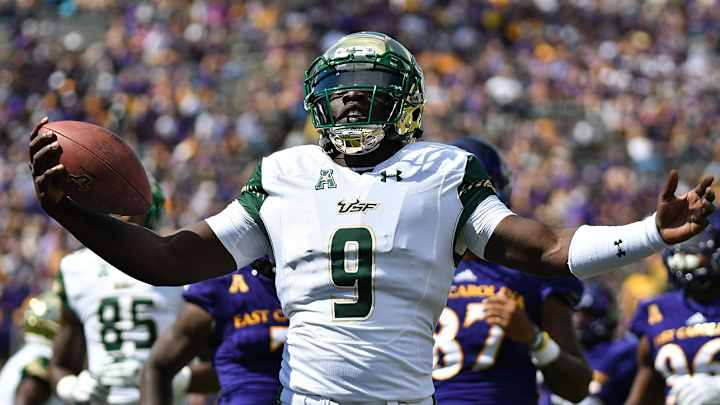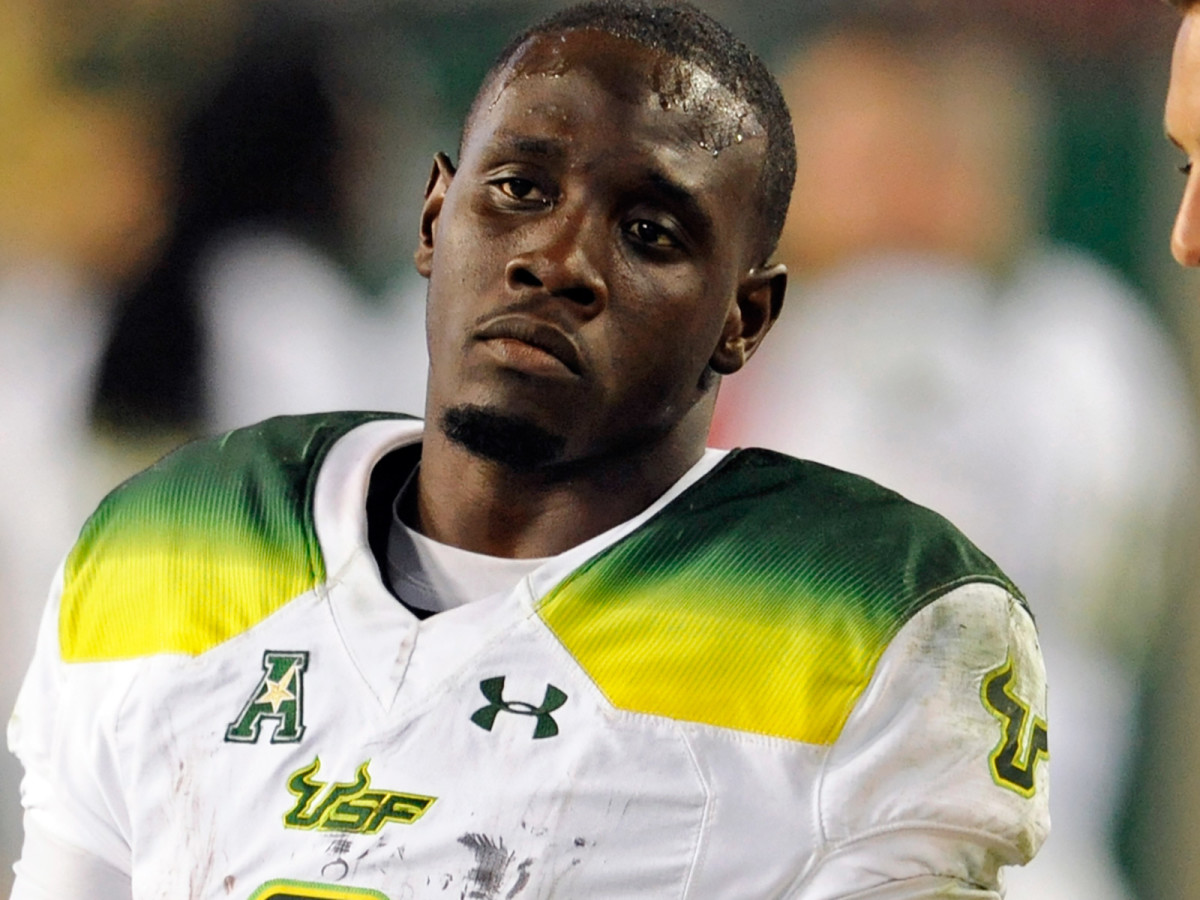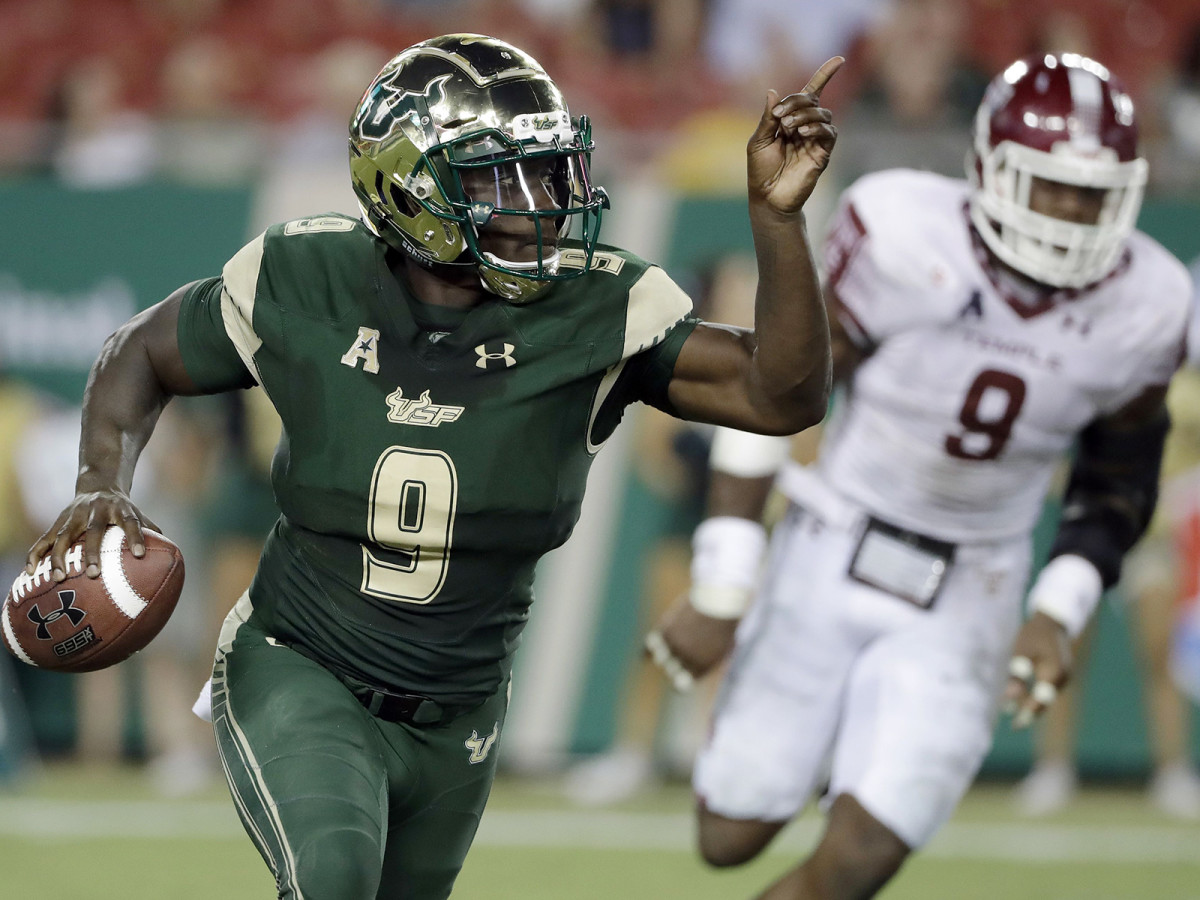How Quinton Flowers Pulled Through Personal Tragedy to Lead USF Back Into the Spotlight

Quinton Flowers was sitting at his coach’s dinner table, listening quietly as a conversation unfolded around him that would change his career.
It was September 2015. The South Florida quarterbacks and running backs were meeting at head coach Willie Taggart’s two-story Spanish-style villa three and a half miles from campus, trying to figure out how to keep the Bulls’ 1–3 start from spiraling into a fourth-straight losing season. Flowers, a sophomore, had struggled to assert himself under center, but running back Darius Tice knew that the quarterback was capable of much more.
The two players had squared off for rival teams in the Miami area, where Flowers, then considered one of the better athletes in the state—he had offers from Alabama, Florida and Texas—put up video-game numbers, throwing for 6,042 yards and rushing for 2,002 at Miami Jackson Senior High. But since they had become teammates, that version of Flowers was nowhere to be seen. He was tentative, robotic, focusing on fundamentals rather than instinct.
“We need to let Quinton be himself,” Tice told Taggart. “Come out of the tunnel, be wild and free.”
Taggart turned to Flowers and said, “So go out and do what you do.”
Be wild and free. The next Saturday he passed for 259 yards in a 54–24 win over Syracuse. Since then, USF has gone 27–5, while Flowers has rushed for 3,182 yards, eighth-most among all active players, and has thrown for 6,680. His 37 rushing touchdowns are second most among all players. As a junior last year, Flowers piled up 4,339 total yards with 42 touchdowns and became the first Florida collegian—including Tim Tebow—to pass for 2,000 yards and run for 1,000 in a season.
The Bulls are 9–1 this fall with Flowers leading the way, and their matchup on Friday against No. 15 UCF will send one team to the American Athletic Conference title game, likely with a coveted trip to a New Year’s Day bowl on the line. Amid Miami’s renaissance and UCF’s offensive fireworks elsewhere in the state of Florida, college football fans have largely overlooked the show Flowers & Co. have put on in Tampa, with help from former Texas coach Charlie Strong, who took over after Taggart left for Oregon in December.
Be wild and free. For too long, one of the best dual-threat quarterbacks in the country had been playing—and living—in a shell, and in fear, after taking one devastating hit after another.

Liberty City is 10 miles northeast of South Beach; both are Miami neighborhoods, but they are worlds apart. To get to Liberty City from the glittery beaches, the Art Deco buildings and the $85 seafood dinners of South Beach, take the MacArthur Causeway over Biscayne Bay, through Wynwood and the abandoned RC Cola plant and Allapattah and Little Haiti. You might recognize the neighborhood from its starring role in the Oscar-winning movie Moonlight. In a 28-day span in September, there were 39 assaults in a half-mile radius surrounding it.
But there are pockets of hope. Liberty City is home to a disproportionate amount of NFL players—Antonio Brown, Amari Cooper, Elvis Dumervil, among others—and strong family units, like the one Flowers had growing up. Every Sunday was a party at the yellow house on 75th and 17th. Nancy and Nathaniel Flowers had the Dolphins game on the TV, food on the grill, friends and family over.
On one of those Sundays in 2002, a seven-year-old Flowers was on the front porch, sitting on his dad’s lap, watching the Dolphins. Nathaniel, who worked for the city of Miami as a garbage collector, gave his son money to get a snack. Before Quinton could even get to the store, there was a bang. Nathaniel had been struck with a stray bullet, the unintended victim of a drive-by shooting.
“What if I was sitting on my dad’s lap playing with him?” Flowers says. “That could’ve been me.”
After his father’s death, Quinton found salvation on the football field. While his mom would stay late at Liberty City Elementary, where she worked as both a cafeteria worker and a custodian, Flowers would play with the Liberty City Optimist Club at Charles Hadley Park on NW 50th Street, the same team that nurtured NFL players Lavonte David, Devonta Freeman and Duke Johnson.
“The only time you have to have fun is on the field,” says Tice, who grew up in nearby Miami Gardens. “There’s shootings, bullets hitting innocent kids. When we play football, that’s the best time you can just let everything go.”
Flowers and his mother were close. He would talk to her about everything, from football to girls; she could be overprotective of her youngest kid. “One time I was with my friends, four blocks from home, and she called me,” says Flowers. “She was like ‘Boobie, Boobie, I need you, hurry up.’ I’m running, all the way home, because that’s my mom. I just want to get there, make sure she’s O.K.” Then Flowers chuckles. “Soon as I get in her room, she tells me to pass her the TV remote.”
After Quinton’s sophomore year of high school, he was told she was battling cancer. As she started treatment, he began to excel on the field. Quinton was in Orlando for a football tournament in January 2012 when he logged onto Facebook and saw messages saying that his mother had died. He rushed back to the hospital and found she was still alive. “She couldn’t see, and she couldn't hear. But she told me to get my diploma and continue being myself. That she loves me and will be watching over me.”
Nancy died the next day. Quinton’s older sister Shanay helped with day-to-day responsibilities, as did his Aunt Julie and Uncle Nick. His cousin, former NFL wide receiver Andre Johnson, sent money. But Quinton was still in a downward spiral. “It was a time where I felt like football wasn’t the same, because I lost the main woman in my life,” he says. He had thought of quitting, but his high school coach, former NFL receiver Antonio Brown, rushed over in the middle of the night to convince him otherwise.
The major schools who had recruited Flowers wanted him at different positions. Alabama thought he should be a receiver. South Carolina wanted him as a defensive back. Miami had another position in mind. “The first thing [former coach] Al Golden said: ‘Your legs are big. I think you’re a running back,” Flowers recalls.
But Flowers was adamant: He was a quarterback, and always had been. (As a kid, he left a team after a youth coach put him at offensive line, telling the coach, “I’m a QB.”) USF agreed, and nine games into his freshman season Flowers took the starting job. He called his brother Nathaniel Jr. to tell him the news, but when Nathaniel picked up, he was distraught. Earlier that night, their brother, Bradley Holt, had been shot in Allapattah. A yellow Ford Mustang was approaching an apartment complex where a group of children were playing. Holt, 24, confronted the driver, telling him to stay away from the kids. A few minutes later he was shot in the head.
“I lost it all,” Flowers says. “As I was walking to my room, I started crying. He always told me I was going to be the one to go to college, try to make something out of myself. I was so hurt. That’s the third person in my life.”
Flowers is usually incredibly stoic, betraying little emotion. His teammates say it’s hard to tell what he’s thinking. His sister Shanay says, “You have to talk to him constantly to get anything out of him.”
But Flowers isn’t immune to the pain. When he hears teammates talking about their parents, it will get to him. He’ll call Shanay in the middle of the night.
“You can hear it in his voice, he’ll be hurting,” she says. “I’ll ask him, ‘What’s wrong?’ He’s like, [nothing]. And then I’ll say, ‘Tell me what it is, I can help you.’ And then he’ll break down.”
When he gets emotional, Shanay repeats a message their mom often repeated: Live to die. You’re not going to be here forever—enjoy life. “Every day, I just try to make the best decision because she’s seeing every move I make,” he says.
Flowers also gets inspiration—and comfort—from his one-year-old daughter, Amayah.
“When he sees her, it’s like a sense of relief,” says Shanay. “My mom, his daddy, his brother—now he has someone to rely on him, depending on him, not only in football, but in life, to support her, to be behind her.”
One night in September, Quinton called Nathaniel as he does every night before a game only to find his brother upset again: “Auntie Julie had a heart attack.” She had gone to the hospital for back pain, then had a bad reaction to her medicine. Auntie Julie wasn’t just a typical aunt, Shanay says. When their mom died, Auntie Julie became their go-to person. And now, just like that, Auntie Julie was gone, too.
“She’s in a better place,” Shanay said to him. “Be a better man, not only for yourself, but for your daughter.”
The next day Flowers threw for 186 yards and two touchdowns and led the Bulls to a 31–17 win over Stony Brook.

USF’s football program has come a long way since 1997, when the first team meeting was held under a shade tree for lack of a better venue. (The program now has a $4 million practice complex with three fields, along with a 2,500-square-foot storage building; In August, the school released a feasibility study on the prospects of building a new $200 million stadium on campus, to eliminate the need to play 10 miles away in Raymond James Stadium, the home of the Buccaneers.) USF joined the Big East in 2005, then made four straight bowl games. In ’07, after beating No. 17 Auburn and No. 5 West Virginia, the Bulls opened the season’s first BCS rankings at No. 2, their highest ranking ever, before losing their next three games and fading from national title contention.
In the first half of this decade, USF didn’t make a bowl game. But after Taggart steered the team to an 8–5 season in 2015 and an 11–2 finish last year, the Bulls are back on the rise. In Flowers, they have enjoyed their first breakout star on a national level. “I’m trying to have some spirit surround the school,” Flowers says. “Get these people an opportunity to have something to talk about. When they’re talking about their schools, people can go ‘Oh, I go to USF, we’re doing this at our school.’ I could’ve gone to Florida and just been another person. I could’ve gone to Miami, been another person. I wanted to be that guy.”
Flowers possesses not just a strong, accurate arm, but also top-flight speed—in high school, he was timed at 4.4 in the 40—that most AAC opponents don’t have an answer for. “It’s hard to play against him,” says USF corner Khalid McGee. “When he’s running, it’s not easy. He’s a playmaker.”
This season, both the Bulls and their star quarterback have been a bit inconsistent. Flowers has had muted performances overshadowed by team wins, such as the mere 155 total yards he mustered in a 43–7 win over Temple. He has also had dominant performances, compiling five touchdowns against Illinois and 138 rushing yards against Tulane. Other than a bad 24–20 loss to Houston, in which Flowers threw for 325 yards but only rushed for seven, the Bulls have mostly played to the hype that followed them in the preseason, when many expected them to finish as the Group of Five’s highest-ranked team. They’re in position to raise their national profile with a strong finish, starting with the nationally televised regular season finale against unbeaten UCF the day after Thanksgiving.
When asked about his professional ambitions after this final season ends, Flowers naturally mentions the NFL, where he will no doubt face the same questions about his potential he defied as a high school prospect. But then he quickly brings something else up: He wants to be a firefighter.
“Because a lot of things happen where people need help,” he says. “A lot of people put their hands around me to help me. I just want to be there to help.”
It’s a good fit, too. When things go wrong, Flowers knows what to do: Look straight into the fire and keep going.
